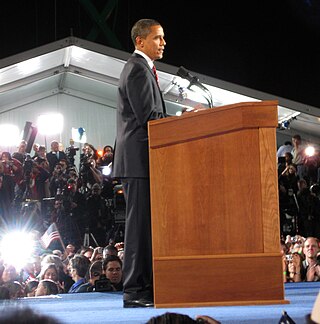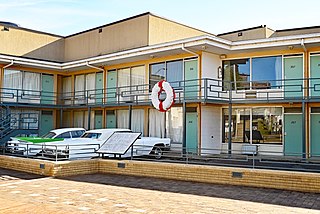
Martin Luther King Jr. was an American Baptist minister, activist, and political philosopher who was one of the most prominent leaders in the civil rights movement from 1955 until his assassination in 1968. A black church leader and a son of early civil rights activist and minister Martin Luther King Sr., King advanced civil rights for people of color in the United States through the use of nonviolent resistance and nonviolent civil disobedience against Jim Crow laws and other forms of legalized discrimination.

Ralph David Abernathy Sr. was an American civil rights activist and Baptist minister. He was ordained in the Baptist tradition in 1948. As a leader of the civil rights movement, he was a close friend and mentor of Martin Luther King Jr. He collaborated with King and E. D. Nixon to create the Montgomery Improvement Association, which led to the Montgomery bus boycott and co-created and was an executive board member of the Southern Christian Leadership Conference (SCLC). He became president of the SCLC following the assassination of King in 1968; he led the Poor People's Campaign in Washington, D.C., as well as other marches and demonstrations for disenfranchised Americans. He also served as an advisory committee member of the Congress on Racial Equality (CORE).

The Southern Christian Leadership Conference (SCLC) is an African-American civil rights organization based in Atlanta, Georgia. SCLC is closely associated with its first president, Martin Luther King Jr., who had a large role in the American civil rights movement.
The Promised Land is Middle Eastern land in the Levant that Abrahamic religions claim God promised and subsequently gave to Abraham and several more times to his descendants.

Benjamin Lawson Hooks was an American civil rights leader and government official. A Baptist minister and practicing attorney, he served as executive director of the National Association for the Advancement of Colored People (NAACP) from 1977 to 1992.

Mason Temple, located in Memphis, Tennessee, is a Christian international sanctuary and central headquarters of the Church of God in Christ, the largest African American Pentecostal group in the world. The building was named for Bishop Charles Harrison Mason, founder of the Church of God in Christ, who is entombed in a marble crypt inside the Temple.

Sealtest Dairy is a Good Humor-Breyers brand for dairy products. Formerly a division of National Dairy Products Corporation of Delaware, it produced milk, cream, ice cream, and lemonade. The Sealtest brand was also later used by various companies in Canada under license.

The Memphis sanitation strike began on February 12, 1968, in response to the deaths of sanitation workers Echol Cole and Robert Walker. The deaths served as a breaking point for more than 1,300 African American men from the Memphis Department of Public Works as they demanded higher wages, time and a half overtime, dues check-off, safety measures, and pay for the rainy days when they were told to go home.

"I Have a Dream" is a public speech that was delivered by American civil rights activist and Baptist minister Martin Luther King Jr. during the March on Washington for Jobs and Freedom on August 28, 1963. In the speech, King called for civil and economic rights and an end to racism in the United States. Delivered to over 250,000 civil rights supporters from the steps of the Lincoln Memorial in Washington, D.C., the speech was one of the most famous moments of the civil rights movement and among the most iconic speeches in American history.

Following his victory in the 2008 United States presidential election, then-President-elect Barack Obama gave his victory speech at Grant Park in his home city of Chicago, on November 4, 2008, before an estimated crowd of 240,000. Viewed on television and the Internet by millions of people around the globe, Obama's speech focused on the major issues facing the United States and the world, all echoed through his campaign slogan of change. He also mentioned his maternal grandmother Madelyn Dunham, who had died just two nights earlier.

The sermons and speeches of Martin Luther King Jr., comprise an extensive catalog of American writing and oratory – some of which are internationally well-known, while others remain unheralded and await rediscovery.

Martin Luther King Jr., an African-American clergyman and civil rights movement leader, was fatally shot at the Lorraine Motel in Memphis, Tennessee, on April 4, 1968, at 6:01 p.m. CST. He was rushed to St. Joseph's Hospital, where he died at 7:05 p.m. He was a prominent leader of the civil rights movement and a Nobel Peace Prize laureate who was known for his use of nonviolence and civil disobedience.
The Mountaintop is a play by American playwright Katori Hall. It is a fictional depiction of Martin Luther King Jr.'s last night on earth set entirely in Room 306 of the Lorraine Motel on the eve of his assassination in 1968.

The Restoring Honor rally was held August 28, 2010 at the Lincoln Memorial in Washington, D.C., and was organized by Glenn Beck to "restore honor in America" and to raise funds for the non-profit Special Operations Warrior Foundation. Billed as a "celebration of America's heroes and heritage," several veterans were honored. Along with Beck, the speakers included former Republican vice presidential nominee Sarah Palin and activist Alveda King, a niece of Martin Luther King Jr.
The history of the 1954 to 1968 American civil rights movement has been depicted and documented in film, song, theater, television, and the visual arts. These presentations add to and maintain cultural awareness and understanding of the goals, tactics, and accomplishments of the people who organized and participated in this nonviolent movement.

And the Walls Came Tumbling Down is a 1989 autobiography written by civil rights leader Ralph Abernathy. The book charts his life and work with his best friend Dr. Martin Luther King Jr. in their leadership of the Civil Rights Movement to help African Americans obtain equal rights with white Americans. His book engendered much controversy due to Abernathy's allegations of King's infidelity the night before he was assassinated.

King in the Wilderness is an American documentary film about Martin Luther King Jr. that premiered on April 2, 2018 on HBO, focusing on the final two years of his life leading up to his assassination on April 4, 1968.

Conspiracy theories about the assassination of Martin Luther King Jr., a prominent leader of the civil rights movement, relate to different accounts of the incident that took place on April 4, 1968, in Memphis, Tennessee. King was assassinated on the balcony of the Lorraine Motel, the day after giving his final speech "I've Been to the Mountaintop". Claims soon arose over suspect aspects of King's assassination and the controversial role of the assassin, James Earl Ray. Although his guilty plea eliminated the possibility of a trial before a jury, within days, Ray had recanted and claimed his confession was forced. Suspicions were further raised by the confirmation of illegal surveillance of King by the FBI and the CIA, and the FBI's attempt to prompt King to commit suicide.

Memphis, Martin, and the Mountaintop: The Sanitation Strike of 1968 is a 2018 children's picture book told in poetry and prose by writer Alice Faye Duncan and illustrator R. Gregory Christie, published by Calkins Creek.















